 Grooms with Honor Series, Books 7-9
Grooms with Honor Series, Books 7-9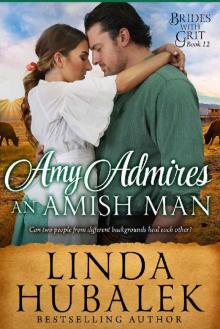 Amy Admires an Amish Man
Amy Admires an Amish Man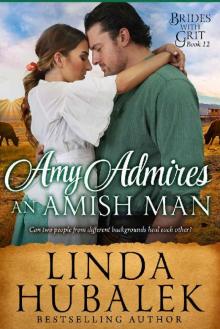 Amy Admires an Amish Man: A Historical Western Romance (Brides with Grit Book 12)
Amy Admires an Amish Man: A Historical Western Romance (Brides with Grit Book 12) Grooms with Honor Series, Books 10-12
Grooms with Honor Series, Books 10-12 Grooms with Honor Series, Books 4-6
Grooms with Honor Series, Books 4-6 Kiowa's Oath
Kiowa's Oath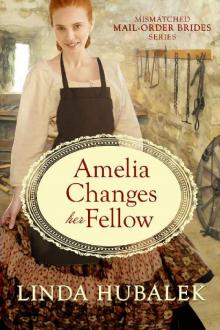 Amelia Changes her Fellow
Amelia Changes her Fellow Grooms with Honor Series, Books 1-3
Grooms with Honor Series, Books 1-3 Gabe's Pledge (Grooms With Honor Book 3)
Gabe's Pledge (Grooms With Honor Book 3) Cullen's Love (Grooms With Honor Book 5)
Cullen's Love (Grooms With Honor Book 5) Cora Captures a Cowboy
Cora Captures a Cowboy Cate Corrals a Cattleman
Cate Corrals a Cattleman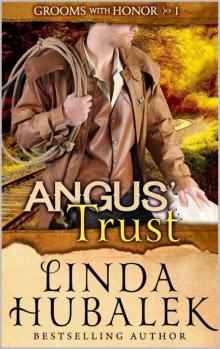 Angus' Trust (Grooms With Honor Book 1)
Angus' Trust (Grooms With Honor Book 1) Elof's Mission (Grooms with Honor Book 9)
Elof's Mission (Grooms with Honor Book 9) Tully's Faith (Grooms with Honor Book 11)
Tully's Faith (Grooms with Honor Book 11) Hilda Hogties a Horseman
Hilda Hogties a Horseman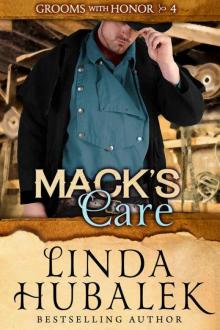 Mack's Care (Grooms With Honor Book 4)
Mack's Care (Grooms With Honor Book 4)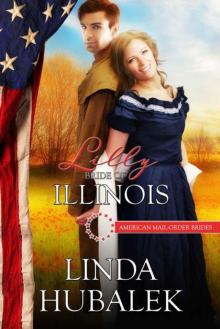 Lilly_Bride of Illinois
Lilly_Bride of Illinois Darcie Desires a Drover: A Historical Western Romance (Brides with Grit Book 7)
Darcie Desires a Drover: A Historical Western Romance (Brides with Grit Book 7) Tina Tracks a Trail Boss: A Historical Western Romance (Brides with Grit Book 8)
Tina Tracks a Trail Boss: A Historical Western Romance (Brides with Grit Book 8) Jasper's Wish (Grooms with Honor Book 10)
Jasper's Wish (Grooms with Honor Book 10) Adolph's Choice (Grooms with Honor Book 7)
Adolph's Choice (Grooms with Honor Book 7) First Street Church: Love's Blessing (Kindle Worlds Novella) (Clear Creek Legacy Book 1)
First Street Church: Love's Blessing (Kindle Worlds Novella) (Clear Creek Legacy Book 1) Montana Sky: Elof's Mission (Kindle Worlds Novella) (Grooms with Honor Book 0)
Montana Sky: Elof's Mission (Kindle Worlds Novella) (Grooms with Honor Book 0) Rania Ropes a Rancher
Rania Ropes a Rancher Fergus' Honor (Grooms With Honor Book 2)
Fergus' Honor (Grooms With Honor Book 2) Faye Favors a Foreman: A Historical Western Romance (Brides with Grit Book 11)
Faye Favors a Foreman: A Historical Western Romance (Brides with Grit Book 11) First Street Church: Love's Double Blessing (Kindle Worlds Novella) (Clear Creek Legacy Book 2)
First Street Church: Love's Double Blessing (Kindle Worlds Novella) (Clear Creek Legacy Book 2) Millie Marries a Marshal
Millie Marries a Marshal Sarah Snares a Soldier
Sarah Snares a Soldier Montana Sky: Jasper's Wish (Kindle Worlds Novella) (Grooms with Honor Friends Book 3)
Montana Sky: Jasper's Wish (Kindle Worlds Novella) (Grooms with Honor Friends Book 3) Helen Heals A Hotelier (Brides With Grit Book 10)
Helen Heals A Hotelier (Brides With Grit Book 10) Seth's Promise (Grooms With Honor Book 6)
Seth's Promise (Grooms With Honor Book 6) Montana Sky: Nolan's Vow (Kindle Worlds) (Grooms with Honor Book 0)
Montana Sky: Nolan's Vow (Kindle Worlds) (Grooms with Honor Book 0) Lorna Loves a Lawyer: A Historical Western Romance (Brides with Grit Book 9)
Lorna Loves a Lawyer: A Historical Western Romance (Brides with Grit Book 9) Nolan's Vow (Grooms with Honor Book 8)
Nolan's Vow (Grooms with Honor Book 8)